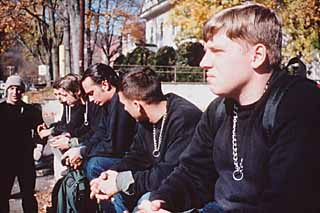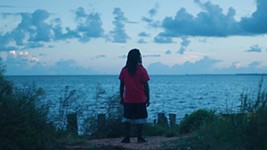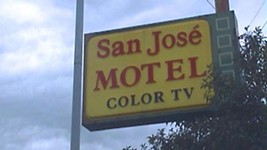Rush Hour
Todd Phillips' 'Frat House' Asks: Will You Ever Dick a Brother?
By Anne S. Lewis, Fri., Sept. 8, 2000

Todd Phillips, co-director of the Sundance-acclaimed Frat House (1998), would prefer to wait until the Q&A following the Alamo screening to get into the nitty gritty of how his film was banned by HBO. "Let me just say that it's been quite painful," he says of the brouhaha which erupted when, among other things, some of the frat brothers' parents went ballistic over the planned airing, and HBO producers capitulated. That said, it bears noting that the 28-year-old NYU film school grad has actually done quite well since making the film he calls a documentary version of Animal House. There was this summer's hit -- his first narrative feature -- Road Trip, followed by the recent theatrical release of his third documentary Bittersweet Motel, about the rock group Phish. Even his first documentary Hated, about punk rocker GG Allin, completed while still a film student, had an extraordinarily successful international theatrical release.
But all of this is small consolation to Phillips. "The worst thing is when people say, 'Oh, well, you got what you wanted out of it,' as though we made the movie just to get an agent or to make certain contacts. As filmmakers, what we wanted out of Frat House was for it to be seen by a large TV audience," he says. HBO, however, owns the film and, despite the entreaties of Phillips and co-director Andrew Gurland, won't let them buy it back. That leaves small screenings with bootlegged videocassettes like the one at the Alamo Drafthouse. "We're just glad that people can see it, however they do," he says.
Frat House follows the pledging process -- a composite of different fraternities -- from rush through hell week, cutting a wide swath through the realm of bad behavior taken so disturbingly seriously that it would probably have given pause even to John Belushi himself. So, really, it's easy to appreciate the post-production distress of both those who signed releases and appeared in the film and the parental units who clung to the dream of a productive post-college life for their release-signing offspring.
What one doesn't expect, after watching the film narrated by Phillips in the grimmest of voiceover tones (and accompanied, oh-so-fittingly, by the soundtrack from A Clockwork Orange), is that the post-production Phillips developed something of a soft spot in his heart for the frat rats -- guys with names like Canker, Blossom, Boozie, and Herpe. This is no less amazing given that Phillips and Gurland, for reasons that I won't reveal here, end up going through the pledging process, including hell week, themselves.
Phillips stresses that it was never their intent in making Frat House to go in as exposé filmmakers and make this "sweeping statement about fraternities or that they should be outlawed." He adds with a sheepish laugh, "I still don't know that hazing is such a bad thing," pointing out that he had no experience with fraternities at NYU and made the film partly out of curiosity about them. "It sounds ridiculous for a semi-intelligent person to say, but you come away almost understanding why they haze. I came out thinking it's kind of funny. Obviously, it's horrible when they take it too far and people die -- but you kind of get it when you're there and see that what these kids have is a problem with standing out. I grew up wanting to stand out, to be an individual. So for me, the revelation in the film was the lengths people will go to be part of an identifiable group and not stand out. The hazing is just an initiation rite that goes along with that -- they just do it to keep themselves entertained."
You have to admit, there is something humorous in the spectacle of watching the tall, skinny, horn-rimmed city boy, Phillips, whom the brothers dismissively call "Bones," placed in an animal cage and treated to some of the brothers' perverse best. (And what a great touch at the end: The pledges emerge from the aptly named hell week to be welcomed, as brothers, into the hail-fellow-well-met arms of their recent tormentors -- to the accompaniment of "Pomp and Circumstance." It jolts you right back to an "Oh, yeah, this has all been taking place at an institution of higher learning.")
Although Phillips didn't look all that amused on film -- and partner Gurland was fortuitously excused from the festivities due to a torture-induced emergency room admission -- Phillips is more circumspect now: "When you actually go through the hazing, you sort of understand why they do it. It really does increase the bonding with your fellow pledges, like going through a war. That's really what they're trying to do. They're not trying to lock people in trunks and kill them. They're trying to form a bond that will outlast college." As one of the brothers says in the film, "It all comes down to one question: 'Will you ever dick a brother?'" That, says Phillips with a laugh, really is the thesis of the film.
Austin Chronicle: Talk a bit about the effect of having your crew of four -- the two directors, a cameraman, and a soundman -- present, camera running, while you've got these frat brothers doing their thing. Is there any way they were not completely aware of the camera?
Todd Phillips: No, absolutely, they were absolutely aware of the camera. Anybody that tells you that in anything -- from Survivor to any documentary made in this day and age -- they weren't aware of the camera and its power is lying, because I think people are far too aware how much a camera can change their lives. When documentary was just starting, like with cinéma vérité in the Sixties, I don't think people truly understood the power of the camera, but to say that today is ridiculous. I don't think people are necessarily acting for the camera, but they are definitely aware of it. Everyone has a different reaction -- some hold back and some play the part they think they're expected to play only more so -- and I think that's just something that you have to accept as a documentary maker today. You can say you're a fly on the wall, but it's not true. Unless they're drunk or high and, of course, there were those moments in Frat House, but to say that people weren't aware of the crew is just wrong.
AC: Well, not to pre-empt the discussion of the HBO debacle that you want to save for the Alamo, but can you give me the Reader's Digest version of the problems?

TP: Well, there were lots of things said about the film. The parents complained that a lot of the boys were drunk or stoned in the film and got worried about how that would affect their futures -- and argued that they hadn't known what they were doing when they signed releases. (Probably one of the problems was the probable pressure that the pledges felt to sign releases once the brothers had decided to participate.) To me, this uproar showed that you can show any film about hookers or strippers, crackheads, etc., because they don't have lawyers. But make a movie about middle-class white kids, and this is what happens.
Then there were allegations that we'd paid people to participate in the film which was not true, though it's done all the time, and if we had, I would proudly admit it. And they said it was staged, which it was not.
AC: Do you think your objectivity was hampered by having to actually take part in the pledging?
TP: No, I think more filmmakers and journalists should go through the thing they're trying to document to have a better understanding of it. It opens your eyes to certain preconceptions you might have.
AC: And you came out more sympathetic?
TP: Uh, I wouldn't say sympathetic. I just understand it in a different way. It's hard to explain, because you come out sounding like, "Omigod! This guy's turned into a frat guy!" I was actually surprised that I came away from it feeling this way. Fraternities are very easy targets. It's easy to laugh at a frat guy, but if you really open your mind to it -- I'm not saying it becomes a good idea, but you definitely come away from it with a more well-rounded understanding of the reasons behind it.
AC: So you've made three documentaries in seven years and one summer blockbuster narrative film. How does Road Trip, the latter, fit into your career plan?
TP: My career plan is to make movies, so it fits right in. My plan is not in any way to be a journalist. Filmmaking is all storytelling to me. Whether you're doing it with real people or not, you're still telling a story, you're still creating characters, still creating a beginning, middle, and an end, whether it's a narrative film or a documentary. I plan on always going back and forth -- I love documentaries, but that's because there are stories in the real world that I don't think you can do that well in a narrative and vice versa. Documentary is storytelling, but in a different way. Documentary became a very boring word, but I see it all as storytelling -- not the ugly stepsister to narrative film. It's all the same thing.
I'm not a journalist who goes out and gets information and then puts it into a story. To me, a documentary is just using real people and events to tell a story. The techniques are the same -- at least mine are. I still write a script of how I want it to go and hope I can steer it, through directing, the way I want it to go. I'm a very hands-on director. I know the movie I want to make when I start out. Film is too expensive to just go in and roll like a fly on the wall. While editing is a huge part of the film, I'm not someone who wants to find the movie in the process of editing.
AC: What's been the reaction to the film outside of the HBO hoopla? Any fallout from the donnybrook with expletive-spewing Blossom, the brother who originally welcomed you into the frat house and later threw you out?
TP: I will forever be looking over my shoulder. I do not lead a very relaxed life now.
AC: Seriously?
TP: Not tremendously, but to a point. Recently, I was on The Howard Stern Show promoting Road Trip, and Blossom called in and said, "I'm going to kick this guy's ass ..." Sometimes I bump into one of the brothers here on the streets of New York -- some of them are now working on Wall Street. I think if I ran into them in a group and they were drunk, I might have a problem, but when I bump into one of them on the street, they'll say something like, "Bones, dude, Blossom's looking for you, man, he wants to kill you." [laughs] I also hear that the film circulates through frat houses at colleges all over the country, and people tell me that this college or that one makes the pledges watch the film and recite lines from it while they're hazing them. [laughs] I'm not saying that's a good thing at all, but apparently they don't see the damage in it. That's just part of life's great art. ![]()
Frat House will be presented as part of the Texas Documentary Tour on Wednesday, September 13, 7:30pm & 9:30pm, at the Alamo Drafthouse, 409 Colorado. Filmmaker Todd Phillips will introduce the film and conduct a Q&A session following the screening. Advance tickets are available for Austin Film Society members only by calling 322-0145. Tickets will go on sale at 6:15pm on the day of the show. Admission prices are $6 per show for the general public; $4 for Austin Film Society and KLRU members and students. The Texas Documentary Tour is a co-presentation of the Austin Film Society, the University of Texas RTF Dept., The Austin Chronicle, KLRU-TV, and SXSW Film.










